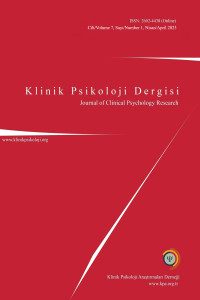Bağlanma stilleri ile ilişki merkezli ve partner odaklı obsesif kompulsif belirtiler arasındaki ilişkide evlilik uyumunun aracı rolü
The mediator role of marital satisfaction between the attachment styles and relationship-centered and partner-focused obsessive compulsive symptoms
Author(s): Ebru Pelin Özel, Selin KaraköseSubject(s): Social psychology and group interaction, Clinical psychology, Family and social welfare
Published by: Klinik Psikoloji Araştırmaları Derneği
Keywords: anxious attachment; avoidant attachment; marital satisfaction; relationship centered obsessive compulsive symptoms; partner focused obsessive compulsive symptoms;
Summary/Abstract: Insecure attachment in close relationships in adulthood affects the quality of the relationship and is closely related to various psychopathologies. Relationship-centered and partner-oriented obsessions and compulsions are concepts that have been introduced to the literature in recent years and are considered an important part of obsessive-compulsive symptoms. Although previous studies investigated the associations between insecure attachment patterns and relationship obsessive-compulsive disorder in individuals in romantic relationships, the mediator role of marital satisfaction in this relationship has not been examined. The aim of this study was to investigate the mediational role of marital satisfaction between the relationship adult attachment styles and relationship-centered and partner-focused obsessive-compulsive symptoms. The sample of the study consisted of 380 married individuals (200 females, 180 males) between the ages of 22-70 (M = 40.75, SD = 10.57) living in Istanbul, Turkey. Participants completed the Sociodemographic Information Form, Experiences in Close Relationship Scale-Revised (ECR-R), Dyadic Adjustment Scale (DAS), Relationship Obsessive-Compulsive Inventory (ROCI) and, Partner-Related Obsessive-Compulsive Symptoms Inventory (PROCSI). Findings indicated that marital satisfaction demonstrated a mediational role between insecure attachment styles and relationship-centered and partner-focused obsessive-compulsive symptoms. These results implicate that clinicians might consider the role of the insecure attachment styles and marital satisfaction in the treatment of relationship obsessive-compulsive disorder.
Journal: Klinik Psikoloji Dergisi
- Issue Year: 7/2023
- Issue No: 1
- Page Range: 11-25
- Page Count: 15
- Language: Turkish

